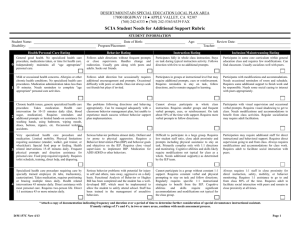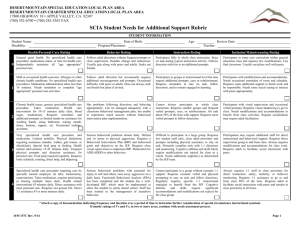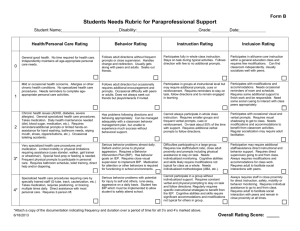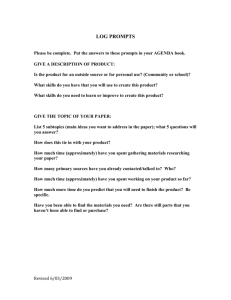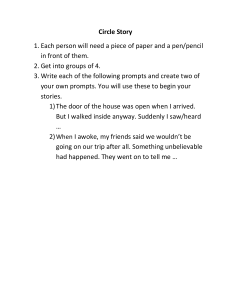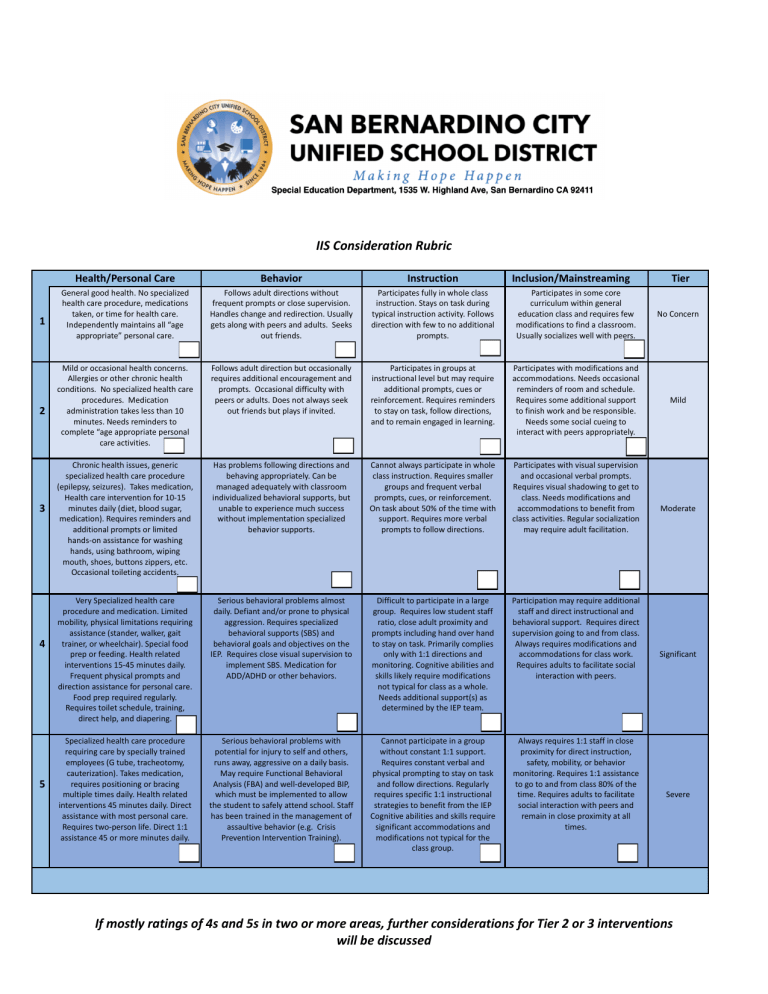
IIS Consideration Rubric 1 2 3 4 5 Health/Personal Care Behavior Instruction General good health. No specialized health care procedure, medications taken, or time for health care. Independently maintains all “age appropriate” personal care. Follows adult directions without frequent prompts or close supervision. Handles change and redirection. Usually gets along with peers and adults. Seeks out friends. Participates fully in whole class instruction. Stays on task during typical instruction activity. Follows direction with few to no additional prompts. Inclusion/Mainstreaming Participates in some core curriculum within general education class and requires few modifications to find a classroom. Usually socializes well with peers. Tier No Concern Mild or occasional health concerns. Allergies or other chronic health conditions. No specialized health care procedures. Medication administration takes less than 10 minutes. Needs reminders to complete “age appropriate personal care activities. Follows adult direction but occasionally requires additional encouragement and prompts. Occasional difficulty with peers or adults. Does not always seek out friends but plays if invited. Participates in groups at instructional level but may require additional prompts, cues or reinforcement. Requires reminders to stay on task, follow directions, and to remain engaged in learning. Participates with modifications and accommodations. Needs occasional reminders of room and schedule. Requires some additional support to finish work and be responsible. Needs some social cueing to interact with peers appropriately. Mild Chronic health issues, generic specialized health care procedure (epilepsy, seizures). Takes medication, Health care intervention for 10-15 minutes daily (diet, blood sugar, medication). Requires reminders and additional prompts or limited hands-on assistance for washing hands, using bathroom, wiping mouth, shoes, buttons zippers, etc. Occasional toileting accidents. Has problems following directions and behaving appropriately. Can be managed adequately with classroom individualized behavioral supports, but unable to experience much success without implementation specialized behavior supports. Cannot always participate in whole class instruction. Requires smaller groups and frequent verbal prompts, cues, or reinforcement. On task about 50% of the time with support. Requires more verbal prompts to follow directions. Participates with visual supervision and occasional verbal prompts. Requires visual shadowing to get to class. Needs modifications and accommodations to benefit from class activities. Regular socialization may require adult facilitation. Very Specialized health care procedure and medication. Limited mobility, physical limitations requiring assistance (stander, walker, gait trainer, or wheelchair). Special food prep or feeding. Health related interventions 15-45 minutes daily. Frequent physical prompts and direction assistance for personal care. Food prep required regularly. Requires toilet schedule, training, direct help, and diapering. Serious behavioral problems almost daily. Defiant and/or prone to physical aggression. Requires specialized behavioral supports (SBS) and behavioral goals and objectives on the IEP. Requires close visual supervision to implement SBS. Medication for ADD/ADHD or other behaviors. Difficult to participate in a large group. Requires low student staff ratio, close adult proximity and prompts including hand over hand to stay on task. Primarily complies only with 1:1 directions and monitoring. Cognitive abilities and skills likely require modifications not typical for class as a whole. Needs additional support(s) as determined by the IEP team. Participation may require additional staff and direct instructional and behavioral support. Requires direct supervision going to and from class. Always requires modifications and accommodations for class work. Requires adults to facilitate social interaction with peers. Specialized health care procedure requiring care by specially trained employees (G tube, tracheotomy, cauterization). Takes medication, requires positioning or bracing multiple times daily. Health related interventions 45 minutes daily. Direct assistance with most personal care. Requires two-person life. Direct 1:1 assistance 45 or more minutes daily. Serious behavioral problems with potential for injury to self and others, runs away, aggressive on a daily basis. May require Functional Behavioral Analysis (FBA) and well-developed BIP, which must be implemented to allow the student to safely attend school. Staff has been trained in the management of assaultive behavior (e.g. Crisis Prevention Intervention Training). Cannot participate in a group without constant 1:1 support. Requires constant verbal and physical prompting to stay on task and follow directions. Regularly requires specific 1:1 instructional strategies to benefit from the IEP Cognitive abilities and skills require significant accommodations and modifications not typical for the class group. Always requires 1:1 staff in close proximity for direct instruction, safety, mobility, or behavior monitoring. Requires 1:1 assistance to go to and from class 80% of the time. Requires adults to facilitate social interaction with peers and remain in close proximity at all times. Moderate Significant Severe If mostly ratings of 4s and 5s in two or more areas, further considerations for Tier 2 or 3 interventions will be discussed If mostly ratings of 4s and 5s in two or more areas, further considerations for Tier 2 or 3 interventions will be discussed
